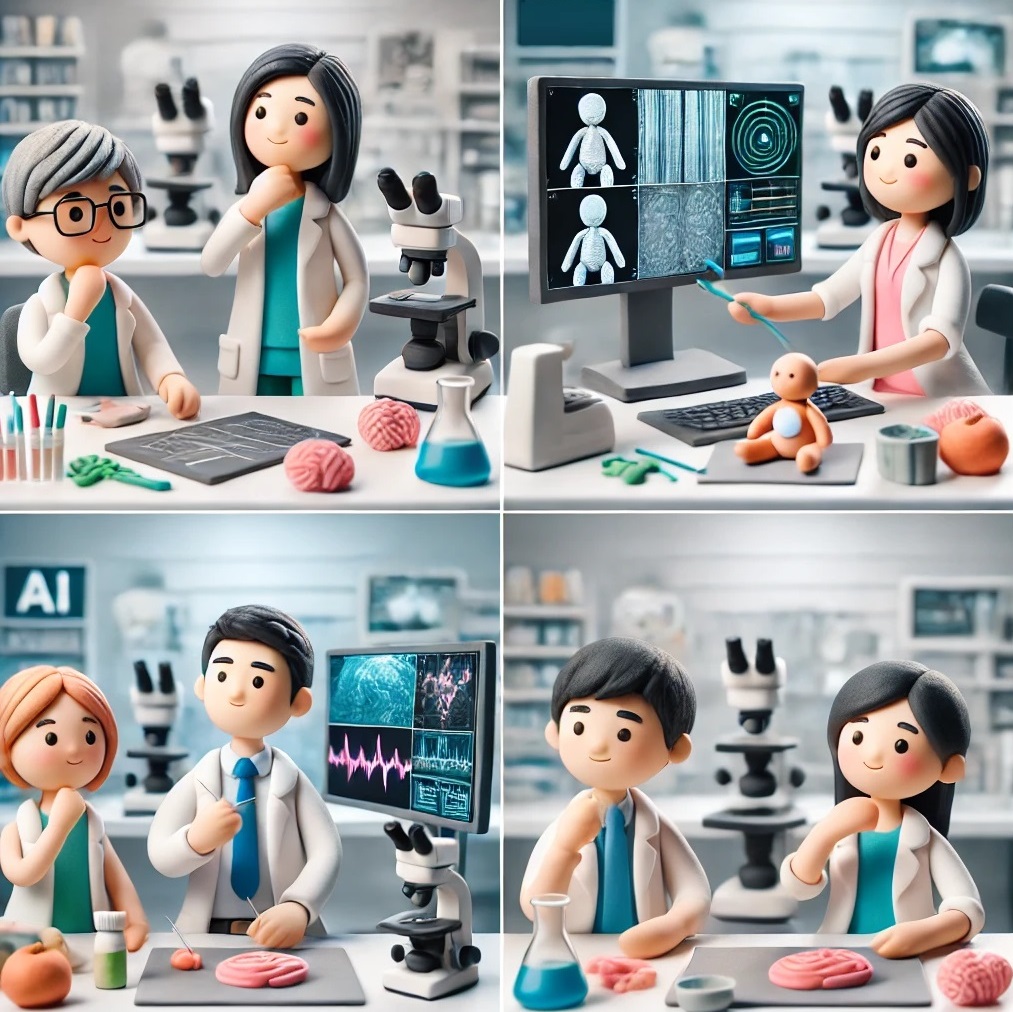In today’s rapidly evolving technological landscape, Artificial Intelligence (AI) is no longer just a buzzword; it has become an integral part of numerous industries, driving innovation and efficiency. One of the most promising AI technologies to emerge is generative AI, which allows for complex problem-solving through intuitive and natural interactions. No longer bound by rigid commands or intricate software instructions, generative AI leverages the power of conversational question-and-answer (Q&A) interfaces to accelerate learning, enhance productivity, and democratize access to sophisticated tools.
This blog explores how generative AI, particularly through its ability to replace complex commands with conversational Q&A, is transforming knowledge acquisition across industries. We’ll dive into real-world examples, such as AI applications in medical imaging and biotech research, illustrating how this technology enables experts to work faster and smarter, while simultaneously empowering non-experts to harness advanced technologies with ease. This shift from traditional software-driven processes to more natural, human-like interactions could be the key to unlocking new levels of efficiency and innovation.
The Power of Conversational AI: A Paradigm Shift in Learning
Generative AI redefines how we interact with machines. Traditionally, interacting with software or tools required expertise in understanding complicated command structures or navigating intricate user interfaces. This learning curve was often steep, slowing down knowledge transfer and creating barriers for those without technical expertise. Today, generative AI breaks down these barriers by offering a conversational interface that allows users to engage with complex systems using natural language.
Rather than inputting highly specific commands, users can now ask AI systems questions directly, in plain language. This dramatically accelerates learning, as individuals no longer need to invest time mastering complex systems. Instead, they can focus on problem-solving and creativity, with the AI providing the technical scaffolding necessary to execute tasks efficiently.
Medical Imaging: How AI is Revolutionizing Diagnostics
The field of medical imaging offers an excellent case study in how generative AI is transforming knowledge acquisition and task execution. In areas such as diagnostic imaging and radiation therapy, AI is being used to assist with tasks like image classification, anomaly detection, and automated image analysis.
Traditionally, professionals in the medical field needed extensive training to use specialized software tools for analyzing medical images. Radiologists, for instance, had to manually review large volumes of medical data, looking for signs of tumors, fractures, or other anomalies. These tasks were time-consuming, and even the smallest oversight could have serious consequences.
Now, with the integration of AI-powered tools, medical imaging analysis is becoming faster, more accurate, and far more accessible. For example, AI systems trained to recognize specific patterns in X-rays or MRIs can identify anomalies within seconds, allowing medical professionals to focus on diagnosis and treatment plans. By asking the AI to “show abnormalities in the brain MRI” or “highlight potential tumor regions,” medical practitioners can bypass the need for manual scanning and processing of images.
AI in Radiotherapy: Precision and Efficiency
In radiation therapy, where precision is paramount, AI is further streamlining workflows. AI algorithms can now assist in optimizing treatment plans, ensuring that radiation is targeted precisely at cancerous tissue while minimizing exposure to surrounding healthy cells. This level of precision would be impossible to achieve through manual processes alone. Furthermore, AI reduces the time required to design these treatment plans, meaning patients can start therapy sooner.
By removing the need for complex software commands, generative AI allows healthcare providers to focus on patient care rather than technology management. This revolution in medical imaging not only speeds up diagnosis and treatment but also democratizes access to these life-saving technologies.
Biotech Research: Accelerating Discovery with AlphaFold
Generative AI’s impact isn’t limited to medical imaging. In the world of biotech research, AI is revolutionizing the way scientists approach molecular biology. A prime example is the use of AlphaFold, an AI model developed by DeepMind, which has made groundbreaking advances in protein structure prediction.
Understanding protein structures is crucial for drug discovery, vaccine design, and studying disease mechanisms. However, predicting protein structures from their amino acid sequences used to be a slow, labor-intensive process, requiring researchers to manually input data into complex modeling software.
AlphaFold has changed the game. The AI model can now predict the three-dimensional structure of proteins with high accuracy, drastically reducing the time required for research. For instance, researchers at Chang Gung University have integrated AlphaFold into their curriculum, allowing students to study protein structures in a fraction of the time previously needed. Instead of manually inputting sequences into specialized software, students can now interact with AlphaFold using simple, conversational Q&A interfaces, asking questions like “What is the structure of this protein?” or “Show me the surface of this protein.”
This approach doesn’t just speed up research; it also enhances the learning experience. By enabling researchers to visualize proteins in 3D and understand their functions more intuitively, AlphaFold and generative AI open up new possibilities in biotechnology. Researchers can explore molecular interactions, disease mechanisms, and potential therapeutic targets with unprecedented speed and accuracy.
Democratizing Knowledge: AI Makes Complex Concepts Accessible
One of the most exciting aspects of generative AI is its potential to democratize access to knowledge. In both medicine and biotech research, the steep learning curve associated with using specialized tools has historically limited participation to experts. Generative AI, with its intuitive conversational interfaces, makes it easier for non-experts to engage with advanced technologies.
For instance, a medical student learning about protein structures no longer needs to spend weeks mastering complex visualization tools. Instead, they can ask a generative AI system to “show the interaction between this protein and its receptor” or “highlight the active site of this enzyme.” In doing so, they gain a deeper understanding of biological processes without being held back by technical barriers.
This democratization extends beyond just education. In the biotech and pharmaceutical industries, AI is enabling small startups to compete with larger, established companies. By eliminating the need for expensive, specialized software and highly trained personnel, generative AI allows smaller players to innovate and conduct research more efficiently.
Speeding Up Learning Across Disciplines
Generative AI’s ability to transform how knowledge is acquired isn’t limited to the medical and biotech fields. The same principles apply across various industries. From legal research to software development and even creative fields like design and music composition, AI’s potential to replace complex commands with simple Q&A interfaces is speeding up learning and productivity.
In legal research, for instance, generative AI systems can quickly retrieve and summarize relevant case law, allowing legal professionals to focus on strategy rather than manual research. In software development, AI-powered code assistants can generate functional code snippets based on a developer’s questions, making it easier for non-experts to participate in technical projects. In creative industries, AI tools allow designers and musicians to generate complex visual or audio content by simply describing their ideas, bypassing the need for technical mastery of design software or music production tools.
Future Outlook: The Role of Generative AI in Accelerating Knowledge
The future of learning and productivity lies in generative AI’s ability to simplify complex processes through conversational interfaces. As AI continues to evolve, we can expect even greater advances in knowledge acquisition across industries. By replacing rigid command structures with intuitive Q&A interactions, AI empowers users to focus on creativity, innovation, and problem-solving, while the technology handles the underlying complexities.
For organizations looking to stay ahead of the curve, partnering with AI developers who specialize in generative models will be key. By integrating AI into their workflows, companies can unlock new levels of efficiency, reduce the barriers to entry for non-experts, and enable their teams to achieve more in less time.
Conclusion: Partnering with AI for the Future of Learning
Generative AI is not just a tool; it is a transformative technology that is changing the way we learn and work. By simplifying complex processes through conversational Q&A interfaces, AI accelerates knowledge acquisition and makes advanced tools more accessible than ever before. Whether in healthcare, biotechnology, legal research, or creative fields, generative AI is helping professionals work smarter, not harder.
If your organization is looking to harness the power of generative AI to transform your operations, we are here to help. Our team of AI experts specializes in developing custom AI solutions tailored to your industry. From streamlining workflows to democratizing access to cutting-edge tools, we can help you unlock the full potential of AI and drive innovation within your organization.
Reach out to us today to learn more about how generative AI can accelerate knowledge acquisition and give your business a competitive edge.







